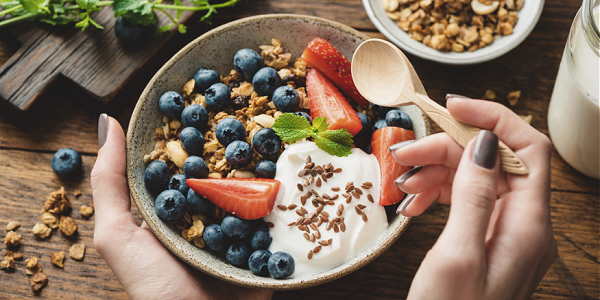
Did you know that the word "vitamin" comes from the Latin word "vita" meaning life? While vitamins are required in small quantities by the body, they play a big role in many essential life functions for all.
With conflicting advice available, it can be difficult to choose a multivitamin or any other vitamin supplement without having second thoughts. Luckily, this article provides evidence-based recommendations from trusted sources.
Read on to learn which are the best vitamins for women of any stage of life.
Benefits of Taking Vitamins for Women
According to research, vitamins at almost any age can help prevent cellular damage and slow or reduce the risk of chronic diseases. Overall, they can improve health from head-to-toe, including skin, teeth, bones, gut health, and heart health.
The best vitamins for women consider the unique stage of life one is in and related changes. These mostly include puberty, pregnancy, menopause, overall aging, and certain health conditions.
Puberty, Pregnancy & Menopause
Certain essential vitamin and mineral needs increase during pregnancy and decrease after reaching menopause.
For example, 400 micrograms (mcg) of folate is recommended daily for women who are not pregnant. For pregnant women, 600 mcg is recommended to decrease the risk of birth defects. The needs for women who breastfeed are also higher, with a recommended amount of 500 mcg per day.
Vitamin B6 is another nutrient to consider, as it is thought to help with symptoms of premenstrual syndrome (PMS).
Overall Aging
Vitamin and mineral needs can vary depending on overall aging. According to the National Institute for Aging, bone loss risk increases with age and can affect the amount of vitamins and minerals recommended.
Aging can also affect vitamin B12 absorption in older women and men, impacting at least 10 to 30 percent of the population.
Health Conditions
Some health issues are unique to women, and others are more likely to affect women than men. This is even when compared to similar ages and health statuses.
In fact, the National Institutes of Health reports women are more likely to experience the following compared to men:
• Depression
• Difficulties quitting smoking
• Rapid bone loss
Such risks are often associated with changes caused by menopause.
Best Vitamins for Women
All vitamins are essential for women’s health. However, these vitamins and supplements are often recommended to protect from common health concerns and improve overall health:
1. Antioxidants (such as vitamins A, C, and E)
2. B vitamins (often known as B-complex vitamins)
3. Vitamin C
4. Vitamin D
5. Probiotics
1. Antioxidants: Vitamins A, C, and E
Antioxidants fight free radicals in the body that damage cell membranes. They play a crucial role in boosting the immune system and protect from illness, inflammation, and injury.
The body is capable of producing antioxidants, yet they mostly come from the foods we eat or taken in supplemental form. These include vitamins A, C, and E.
Vitamins A, C, and E are crucial components of skin and scalp health. This is why they are often included as ingredients in skincare products.
Some studies suggest vitamin E may be helpful for menopause symptoms, says the National Center for Complementary and Integrative Health.
2. B Vitamins
B vitamins are often referred to as vitamin B-complex. There are eight B vitamins and include the following:
1. Vitamin B1 (thiamin)
2. Vitamin B2 (riboflavin)
3. Vitamin B3 (niacin)
4. Vitamin B5 (pantothenic acid)
5. Vitamin B6 (pyridoxine)
6. Vitamin B7 (biotin)
7. Vitamin B9 (folate/folic acid)
8. Vitamin B12 (cobalamin)
Each B vitamin has unique roles in the body. As a whole, B vitamins help the body use the energy it obtains from food to maintain a healthy metabolism.
Pregnant and breastfeeding women need more vitamins B6 and B12 and folic acid for proper fetal development.
3. Vitamin C
For adult women, especially for women of child-bearing age, iron is a nutrient of concern. The body requires iron in order to produce hemoglobin, a protein found in red blood cells.
Vitamin C can help the body absorb iron more effectively. The U.S. National Library of Medicine recommends taking iron pills with 8 ounces of orange juice or a high-quality vitamin C supplement.
Vitamin C also helps the body break down fat sources. This may make the vitamin helpful for weight loss.
4. Vitamin D
Calcium and vitamin D are essential for good bone health, which is a goal for women of all ages. Peak bone mass development occurs in younger years while the risk for fractures increases with age.
In a recent study, calcium and vitamin D supplementation was linked to significant improvements in bone mass density (BMD). BMD is a measure of bone health especially important to women going through menopause.
5. Probiotics
While probiotics are not technically vitamins, scientific evidence supports the health benefits they provide. They can be found in food, drinks, fortified products, and can also be taken as a supplement.
The aim of probiotics is to better help the intestines, the primary site for vitamin absorption, and improve gut health. A healthy gut is more likely to get the vitamins it needs from food and to fuel primary body functions.
Currently, there are no official recommendations for probiotic use. It is best to consult with healthcare providers regarding the appropriate dose, duration, and other relevant details.
How to Find the Best Women's Multivitamin & Supplements
First and foremost, healthcare providers generally encourage meeting nutrient intake by eating a balanced diet. Foods supply other key nutrients supplements lack, including phytochemicals and fiber sourced from whole grains, fruits, and vegetables.
If interested in supplementation, a healthcare provider can help evaluate nutrient levels and help one decide which to safely take. For instance, some supplements are verified gluten-free that is helpful for someone managing celiac disease.
All-in-all, supplemental vitamins can fill in nutritional gaps that may be altered through life stage, disease risk, and age. A multivitamin can likewise be a great option for meeting needs as a woman with a generally low amount of risk.
References:
Draelos ZD. An Oral Supplement and the Nutrition-Skin Connection. J Clin Aesthet Dermatol. 2019;12(7):13-16.
Gordon B. Dietary Supplements and Women's Health. Academy of Nutrition and Dietetics. https://www.eatright.org/food/vitamins-and-supplements/dietary-supplements/dietary-supplements-and-womens-health.
Klemm S. Essential Nutrients for Women while Managing their Weight. Academy of Nutrition and Dietetics. https://www.eatright.org/health/weight-loss/tips-for-weight-loss/essential-nutrients-for-women-while-cutting-calories.
Klemm S. Healthy Eating for Women. Academy of Nutrition and Dietetics. https://www.eatright.org/food/nutrition/dietary-guidelines-and-myplate/healthy-eating-for-women.
Wolfram T. Vitamins, Minerals and Supplements: Do You Need to Take Them. Academy of Nutrition and Dietetics. https://www.eatright.org/food/vitamins-and-supplements/dietary-supplements/vitamins-minerals-and-supplements-do-you-need-to-take-them.







